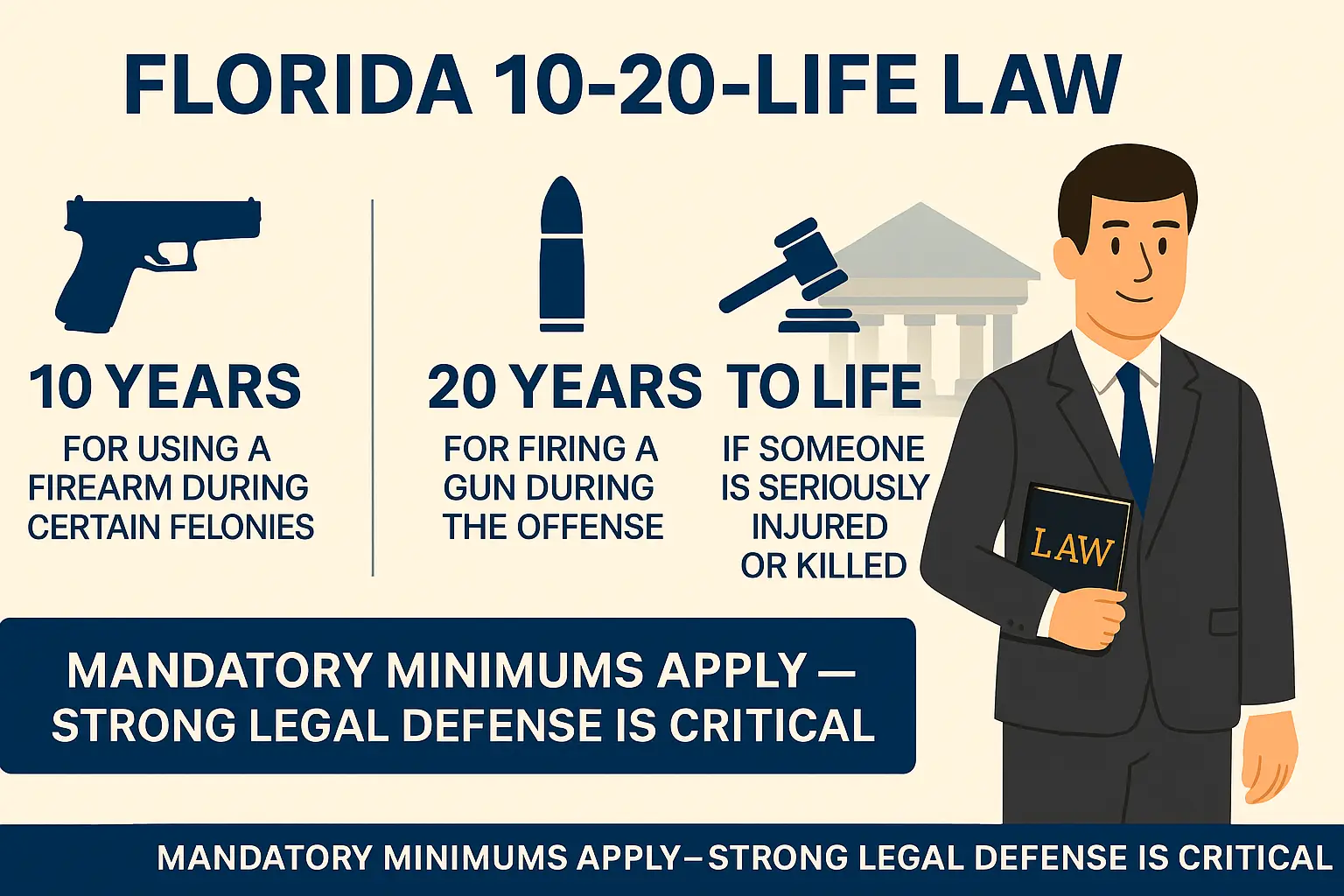Last updated December 2025
🔫 Florida's 10-20-Life Law: What It Means and Who It Affects
Updated for 2025 — Understanding Florida’s Harsh Mandatory Minimum Gun Sentences
Florida’s “10-20-Life” law—codified under Fla. Stat. § 775.087—requires mandatory minimum prison sentences for people who use, display, possess, or discharge a firearm during certain serious or violent felonies.
If you’re facing a firearm-related charge in Fort Lauderdale or South Florida, understanding this statute is critical — because it can force judges to impose decades in prison, even for first-time offenders.
📜 What Is the 10-20-Life Law?
Under § 775.087, if you’re convicted of a qualifying felony and a firearm is involved, the minimum penalties are:
🔟 10 years
If you possessed a firearm during the crime.
2️⃣0️⃣ 20 years
If you discharged a firearm (even if no one was injured).
2️⃣5️⃣–🔒 25 years to life
If you discharged a firearm and caused serious bodily injury or death.
💡 These mandatory minimums run consecutively to any sentence imposed for the underlying felony — not concurrently.
⚖️ Enhanced Penalties for Certain Weapons
If the firearm is:
an assault weapon,
a semiautomatic firearm with a high-capacity magazine, or
a machine gun,
…the minimums increase to:
15 years (possession)
20 years (discharge)
25 years to life (injury/death)
These enhancements are common in Broward trafficking, robbery, and violent crime cases.
🧨 Felonies That Trigger 10–20–Life
The statute applies to many serious felonies, including:
Murder — § 782.04
Sexual Battery — § 794.011
Robbery — § 812.13
Burglary — § 810.02
Arson — § 806.01
Aggravated Battery — § 784.045
Kidnapping — § 787.01
Escape — § 944.40
Aircraft Piracy — § 860.16
Aggravated Child Abuse — § 827.03
Elder/Disabled Adult Abuse — § 825.102
Discharging a Destructive Device — § 790.165
Carjacking — § 812.133
Home Invasion Robbery — § 812.135
Aggravated Stalking — § 784.048
Drug Trafficking — § 893.135
Capital Drug Importation — § 893.135
👉 Related Internal Link:
Drug Trafficking Mandatory Minimums in Florida
🛡️ Defending Against 10–20–Life Charges
When facing mandatory minimums, an experienced defense lawyer will examine:
🔍 Whether the firearm enhancement legally applies
Not all “gun cases” actually qualify under § 775.087.
🔍 Possession vs. discharge vs. injury
Small factual differences = massive sentencing differences.
🔍 Constructive possession & principals theory
The State must prove you actually possessed the firearm — or legally qualify the conduct under principals.
🔍 Chain of custody & firearm evidence challenges
🔍 Downward departure arguments
Rare, but powerful when available.
🔍 Negotiation for lesser-included offenses
A reduction to a non-10–20–Life offense can eliminate decades of mandatory prison.
👉 Related Internal Link:
Motion to Suppress in Florida Criminal Cases
👉 Related Internal Link:
Fort Lauderdale Criminal Defense Attorney
📞 Accused of a Gun Crime in Florida?
The 10–20–Life statute can result in decades behind bars, even with no prior record.
At Michael White, P.A., we represent clients facing major firearm-related offenses across Fort Lauderdale, Broward, and South Florida.
📲 Call (954) 270-0769 or request a free consultation today.
❓ Frequently Asked Questions: Florida’s 10–20–Life Law
Q1: What is Florida’s 10–20–Life law?
A mandatory minimum sentencing law that imposes 10 years for possessing a firearm during certain felonies, 20 years for firing it, and 25 years to life if someone is injured or killed.
Q2: Does the law apply to all felony charges?
No. It applies only to serious felonies listed in § 775.087.
Q3: Can a judge reduce a 10–20–Life sentence?
Not usually. Judges lose discretion unless a valid legal basis for a downward departure applies.
Q4: What happens if I didn’t fire the gun?
Possession alone still brings a 10-year minimum.
Q5: Can I be charged under 10–20–Life if someone else had the gun?
Possibly. The State may argue constructive possession or principals theory; a lawyer can challenge this.

